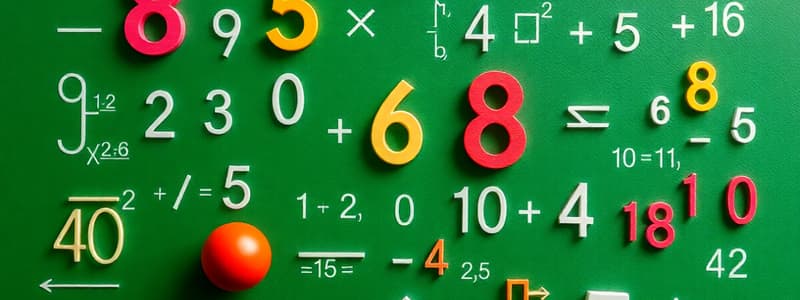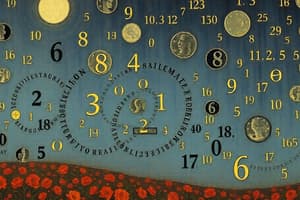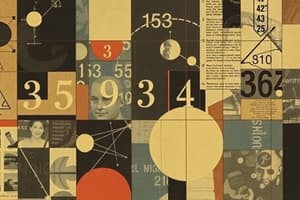Podcast
Questions and Answers
Which type of reasoning uses specific observations to formulate general principles?
Which type of reasoning uses specific observations to formulate general principles?
- Deductive reasoning
- Inductive reasoning (correct)
- Direct proof
- Proof by contradiction
What is the primary purpose of a mathematical proof?
What is the primary purpose of a mathematical proof?
- To explain a mathematical concept
- To develop a problem-solving strategy
- To demonstrate the validity of theorems (correct)
- To present a new definition
Which of the following is NOT a commonly used method in mathematical problem-solving?
Which of the following is NOT a commonly used method in mathematical problem-solving?
- Memorizing solutions to problems (correct)
- Identifying patterns and relationships
- Creating visual diagrams
- Using equations and algebraic manipulations
In which of these fields is mathematics NOT typically used?
In which of these fields is mathematics NOT typically used?
Which strategy would be most helpful for understanding a geometric problem?
Which strategy would be most helpful for understanding a geometric problem?
Which of the following best describes the relationship between natural numbers and whole numbers?
Which of the following best describes the relationship between natural numbers and whole numbers?
What is the primary distinction between rational and irrational numbers?
What is the primary distinction between rational and irrational numbers?
In algebra, what does 'factoring' primarily achieve?
In algebra, what does 'factoring' primarily achieve?
How does coordinate geometry primarily differ from traditional Euclidean geometry?
How does coordinate geometry primarily differ from traditional Euclidean geometry?
What is the fundamental theorem of calculus?
What is the fundamental theorem of calculus?
Which branch of mathematics primarily deals with the study of chance and uncertainty?
Which branch of mathematics primarily deals with the study of chance and uncertainty?
What is the role of 'i' in complex numbers?
What is the role of 'i' in complex numbers?
Which of the following best describes the focus of differential calculus?
Which of the following best describes the focus of differential calculus?
Flashcards
What is mathematics?
What is mathematics?
The study of quantity, structure, space, and change using logic and abstraction.
What are natural numbers?
What are natural numbers?
Numbers used for counting, such as 1, 2, 3, and so on.
What is algebra?
What is algebra?
A branch of mathematics that deals with symbols representing unknown quantities and solving equations.
What is Euclidean geometry?
What is Euclidean geometry?
Signup and view all the flashcards
What is differential calculus?
What is differential calculus?
Signup and view all the flashcards
What is statistics?
What is statistics?
Signup and view all the flashcards
What are integers?
What are integers?
Signup and view all the flashcards
What is probability?
What is probability?
Signup and view all the flashcards
Deductive Reasoning
Deductive Reasoning
Signup and view all the flashcards
Inductive Reasoning
Inductive Reasoning
Signup and view all the flashcards
Mathematical Proof
Mathematical Proof
Signup and view all the flashcards
Problem Solving
Problem Solving
Signup and view all the flashcards
Applications of Mathematics
Applications of Mathematics
Signup and view all the flashcards
Study Notes
Fundamental Concepts
- Mathematics is the study of quantity, structure, space, and change.
- It uses logic and abstraction to define and study concepts.
- Key branches of mathematics include arithmetic, algebra, geometry, calculus, and statistics.
- Mathematical reasoning involves deductive and inductive arguments.
- Problem-solving is a crucial skill in mathematics, often requiring creativity and ingenuity.
Number Systems
- Natural numbers (counting numbers): 1, 2, 3,...
- Whole numbers: 0, 1, 2, 3,... (includes zero)
- Integers:..., -3, -2, -1, 0, 1, 2, 3,... (positive and negative whole numbers)
- Rational numbers: numbers that can be expressed as a ratio of two integers (e.g., 1/2, -3/4, 5)
- Irrational numbers: numbers that cannot be expressed as a ratio of two integers (e.g., √2, π)
- Real numbers: the set of all rational and irrational numbers
- Complex numbers: numbers of the form a + bi, where a and b are real numbers and i is the imaginary unit (√-1)
Algebra
- Algebra uses symbols to represent unknown quantities.
- It involves solving equations and inequalities.
- Basic algebraic operations include addition, subtraction, multiplication, and division.
- Important algebraic structures include groups, rings, and fields.
- Polynomials are expressions involving variables and coefficients.
- Factoring is the process of rewriting an expression as a product of simpler expressions.
Geometry
- Geometry studies shapes, sizes, positions, and properties of space.
- Euclidean geometry deals with shapes in a flat plane.
- Non-Euclidean geometries explore spaces that are not flat.
- Key shapes include lines, angles, triangles, and circles.
- Formulas exist for calculating areas and volumes of various geometric figures.
- Coordinate geometry uses coordinates to represent points in space.
Calculus
- Calculus deals with concepts of change and motion.
- Differential calculus studies rates of change, using derivatives.
- Integral calculus studies accumulation of quantities, using integrals.
- Applications of calculus include calculating areas, volumes, and rates of growth.
- Fundamental theorem of calculus connects differentiation and integration.
Statistics
- Statistics deals with collecting, organizing, analyzing, and interpreting data.
- Descriptive statistics summarizes data using measures like mean, median, and mode.
- Inferential statistics uses data to draw conclusions about a population.
- Probability is the study of the likelihood of events occurring.
- Statistical methods are used in various fields, including social sciences and engineering.
Logic and Proof
- Mathematics utilizes logical reasoning to construct proofs.
- Deductive reasoning uses general principles to reach specific conclusions.
- Inductive reasoning uses specific observations to formulate general principles.
- Mathematical proofs demonstrate the validity of theorems.
- Different proof methods exist, including direct proof, proof by contradiction, and mathematical induction.
Problem Solving
- Mathematical problem-solving involves understanding the problem, developing a strategy, and executing that strategy.
- Strategies include drawing diagrams, making tables, using equations.
- Recognizing patterns and relationships is essential in problem-solving.
- Practice and persistence are keys to improving problem-solving skills.
Applications of Mathematics
- Mathematics is fundamental to various fields like physics, computer science, engineering, and economics.
- It's used in modeling physical phenomena, creating algorithms, designing structures, and analyzing data.
- Mathematical concepts underpin many technological advancements.
Studying That Suits You
Use AI to generate personalized quizzes and flashcards to suit your learning preferences.




